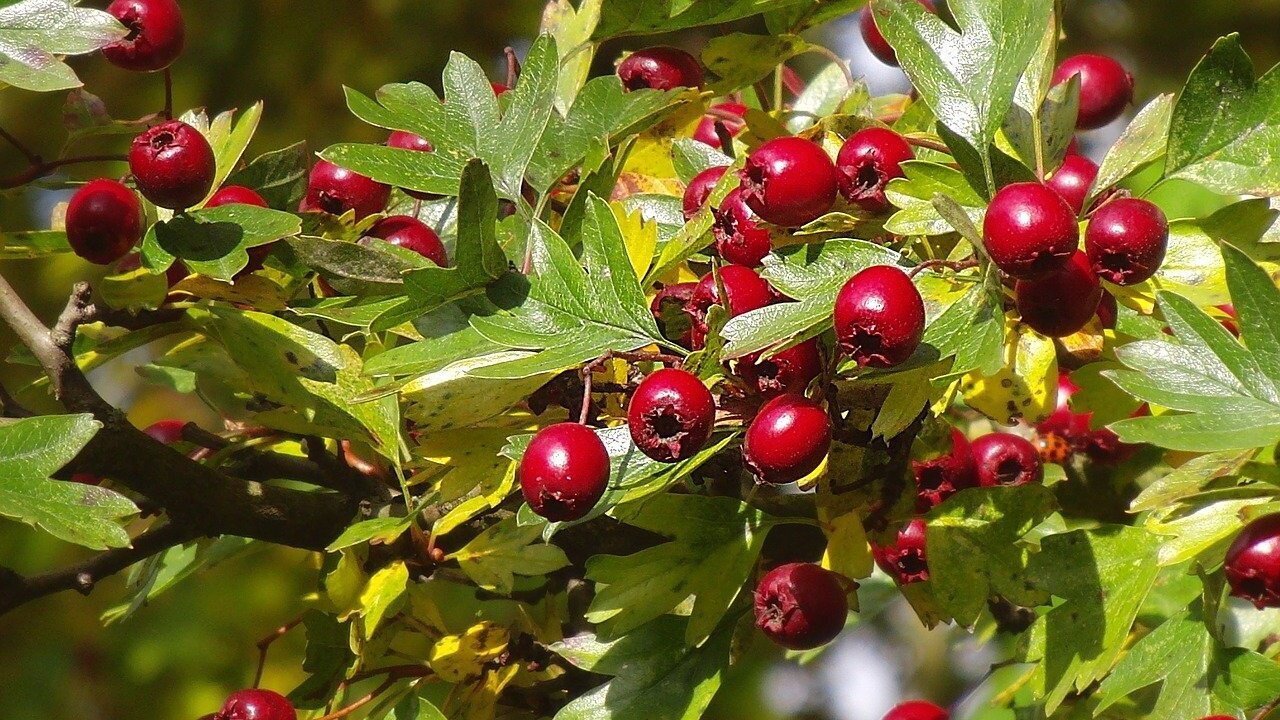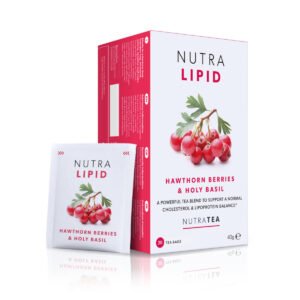Heart-Healing Hawthorn
Hawthorn (Crataegus spp.) is a small thorny tree or shrub in the family Rosaceae. A traditional medicinal food, the berries safely and effectively treat heart disease by lowering both high cholesterol and high blood pressure. Hawthorn berry tea dilates blood vessels, nourishing the heart muscle. It reduces heart pain and slows and regulates fast, irregular pulses. Furthermore, it lowers inflammation and absorbs free radicals. Hawthorn can also ease panic attacks, anxiety, insomnia, and ADHD. The berries have a sweet and sour flavor profile with an astringent, mildly warming effect on the body.

Fresh haw berries
Flavonoids and Vitamin C
The most studied bioactive constituents of hawthorn are flavonoids, the two triterpenes oleanolic acid and ursolic acid, and phenols. The fruit or “haw berries” are high in Vitamin C. Fresh haw berries taste like a very ripe apple.
Improves Lipid Metabolism
Hawthorn berry tea reduces blood lipid levels. Lipids are necessary fatty compounds. Cholesterol and triglycerides are types of lipids. To transport cholesterol and triglycerides around the body in blood, your liver packages them with protein to form lipoproteins, which can be very low-density (VLDLs), low-density (LDLs), or high-density (HDLs). VLDLs and LDLs are “bad cholesterol” because they cause plaque to accumulate in blood vessels, narrowing blood vessels and slowing blood circulation. HDLs are “good” because they carry cholesterol back to the liver to be metabolized and flushed out of the body. High LDLs and low HDLs increase total cholesterol (TC) and total triglyceride (TG), leading to high blood lipid levels. When blood lipid levels are too high, it’s called hyperlipidemia. Hyperlipidemia can lead to atherosclerosis, heart attack, stroke, and peripheral artery disease. The triterpenes oleanolic acid and ursolic acid give Hawthorn an anti-hyperlipidemia effect, improving lipid metabolism and lowering TC and TG.
Hawthorn Berries Ease Physical and Emotional Heart Pain
Over time, hawthorn gently nourishes and strengthens the heart muscle. It reduces and relieves heart pain (angina). Its flavonoids mildly lower high blood pressure (hypertension) by relaxing and dilating blood vessels and strengthening the integrity of their walls. Hawthorn dilates the coronary arteries and increases the heart’s oxygen supply and blood circulation. It also reduces platelet aggregation. Hawthorn’s antioxidant phenols scavenge free radicals, reducing the cardiovascular risks of oxidative stress. Inflammation can throw off the heart muscle’s healthy rhythms, causing irregular or intermittent pulse (arrythmia) and heart palpitations (tachycardia). Hawthorn fights inflammation and strengthens, slows, and regulates heart contractions. Hawthorn is a very safe and effective herb for heart disease, but if you take hypotensive drugs, particularly beta blockers, have your doctor monitor how they interact with hawthorn.

Hawthorn’s fragrant white flowers
Soothes Anxiety
As a nervine and anxiolytic, hawthorn calms the central nervous system. It eases anxiety that comes with panic attacks, a racing heart, emotional stress, and insomnia, particularly when these are caused by grief and life transitions. It also helps with ADHD.
Improves Blood Flow
By strengthening coronary arteries over time, hawthorn can reduce hemorrhoids and varicose veins. It increases blood flow to the limbs, and can help the bedridden.
NutraLipid Tea Soothes the Heart
NutraTea herbalists created NutraLipid: Cholesterol and Lipoprotein Balance tea blend to help combat high cholesterol and encourage the excretion of cholesterol and formation of deposits on arterial walls, while improving blood pressure balance within the body. Let your heart be eased… relax with a mug of hot tea made from hawthorn’s bright, wondrous red berries.


